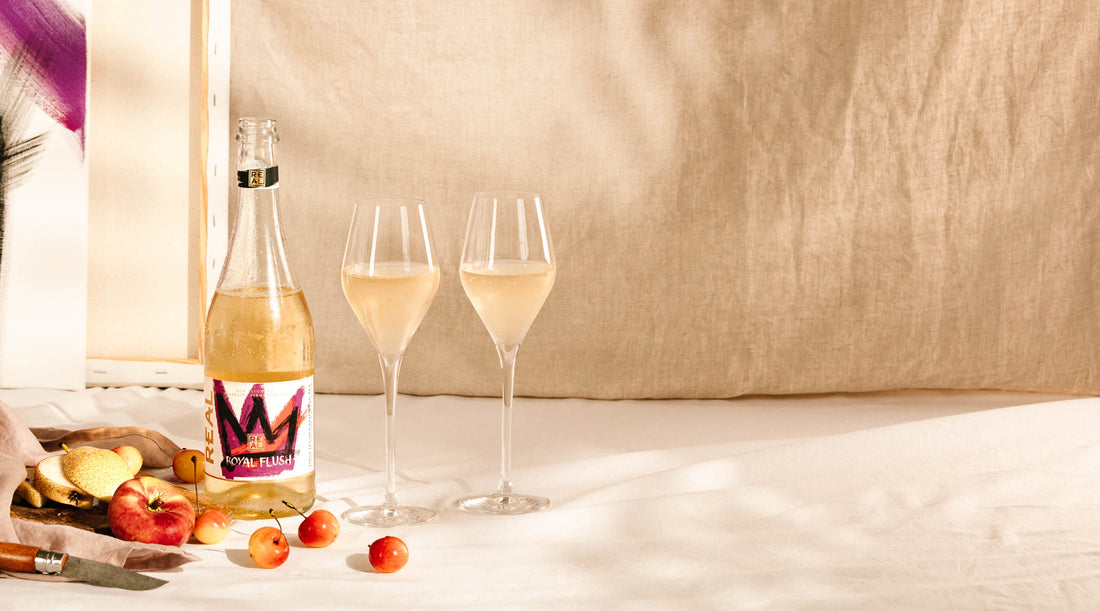In celebration of English Wine Week, REAL takes a look at some of the English wine producers that are pushing things forward. These mavericks not only produce superb and incredibly dynamic wines, but we think their methods and inspirations are really worth shouting about. We definitely see a lot of our own motivations reflected in some of what they do.
Over recent years, English Wine has exploded with innovative independent growers and makers producing acclaimed wines that can compete with the best in the world. Particularly interesting is the rise of natural wine – low intervention, minimal sulphites and filtration. Many are producing pet nat’s and col fondo’s, which often sit at around 10 – 11% ABV. While REAL sits at around 0.5% and is therefore deemed non-alcoholic, it’s encouraging to see wines being produced to such high standards at the lower end of the ABV spectrum (it’s often hard to find a supermarket wine under 12%), making them significantly more versatile and drinkable.
As we’ve discussed elsewhere on this website, we believe that wine doesn’t always have to made with grapes, and some producers are experimenting with other fruits and ingredients to produce sparklings, pet nats or even mead (which, if you’re concerned about whether or not a wine should only be made from grapes, has been described as a “honey wine” for centuries). It really doesn’t surprise us that we’re starting to see the phrase “kombucha wine” cropping up in various corners of the internet. If there’s room in the world for rice wine, fruit wine, and honey wine, then a non-alcoholic wine alternative fermented from tea has a place at the table, too.
Here at REAL we see premium kombucha as being aligned very closely to the natural wine world and the independent producers striving to create unique, innovative and progressive wines with minimal intervention. Our learnings from traditional winemaking techniques and methods, and our knowledge of the live yeast and bacteria cultures we use, mean that we can produce complex non-alcoholic drinks that demonstrate qualities seen in alcoholic wines that outshine many of the dealcoholised wines made from grapes on the market at the moment.
Pleasingly, others in the natural wine world see these similarities, too. REAL is stocked at several significant natural wine shops, including Yield N1 & N16, Shop Cuvée and the Little Wine Shop.
We hope that this burgeoning sparkling category might open up a conversation as to what makes wine wine, and how non-alcoholic options might look to the future rather than dwell too heavily in traditions. Perhaps we will see more sparklings breaking new ground in fermenting with different ingredients that can compete with grapes, using instead the likes of tea, apples or other fruits and botanicals.
6 English Wine Producer's worth checking out:
Westwell Wines:
A really innovative and experimental vineyard based in Kent, Westwell produce still and sparkling wines often with very low intervention and wild ferments.
Earlier this month they released two pet nats – Petulant Nature made with Ortega grapes and Naturally Petulant produced from a blend of Pinot Noir, Pinot Meunier and Chardonnay. At a delightful 10.5% ABV, Westwell bottle three quarters of the way through the natural fermentation so that it finishes in the bottle, trapping the CO2 to become lightly sparkling.
Visit the Westwell Wines website on: westwellwines.com
Tillingham
An acclaimed farmstead, hotel, restaurant and vineyard in East Sussex, producing some of the most original, distinctive and quaffable natural wines in England at the moment. They explain that their philosophy is, “progressive: incorporating what we know of the best scientific and technological knowledge available to us, whilst championing ancient traditions and best practice learnt from millennia of farming and winemaking.”
Founder, Ben Walgate, is a true pioneer, using past traditions to inform the future of his drinks. His historical knowledge of the base ingredients, grown on the 13th-century estate, is combined with a desire to experiement with a choice of fermenting vessels – from steel tanks to terracotta amphoras – to create a constantly impressive range.
Complimenting this forward-thinking approach they produce a sell-out pet nat, PN20 – another 10.5% lightly sparkling natural wine full of berry notes balanced with a more savoury, yoghurt character. This wine is fermented with wild yeast using a blend of locally grown grape varieties, one of which – Regent – is the variety left to ferment skin-on.
Visit the Tillingham website on: tillingham.com
Find & Foster
Pushing the boundaries of what a cider can be, Find & Foster’s ancient orchards in Devon use three different methods, including ‘Methode Traditionalle’, to produce ciders refined enough to stand up in the wine world. They produce several pet nats, not using the traditional grape but the fruit from their orchards, wildly fermenting apples and pears to create seriously sophisticated sparkling Champagne-esque ciders to serve with food.
Visit the Find & Foster website on: findandfosterfineciders.com
Blackbook
One of a handful of London wineries popping up in recent years, winemakers Sergio Verrillo and his wife Lynsey produce drinks as intensely rich, diverse and down-right fascinating as the city they love and live in. The grapes are sourced from growers only a few hours from London, carefully selected for their well-located vineyards and high quality grapes. Their ethos embraces a single fundamental goal: to make bloody good wine.
With stand out artistic labels, so prevalent in the natural wine world, and catchy names for their wines, Blackbook screams vibrancy, brought on in their winemaking process using Pinot Noir and Chardonnay grapes.
Their second release of GMF, a 12% Champagne-method sparkling wine using Seyval Blanc, is fermented with yeast in a mixture of stainless steel and old Burgundy barrels. Bottled under crown cap, this refreshing wine is left undisgorged, giving the benefit of continued lees ageing in bottle, adding to the wine’s texture and complexity. The wine spends a minimum of six months ageing on lees prior to bottling and secondary fermentation.
Visit the Blackbook website on: blackbookwinery.com
Ancre Hills
Ancre Hills is an organic and biodynamic winery in the Wye Valley producing still and sparkling drinks. It is one of the first producers of orange wine and pet nat in this country with their Sui Generis range, a Latin phrase meaning ‘unique – in a class by itself’.
Orange Wine, with its iconic Kubric- inspired labels, is made from hand-harvested Albarino grapes. They are left as whole bunches and they undergo carbonic maceration on skins for 35 days before pressing. They ferment with indigenous yeasts used at ambient temperatures before ageing in old Austrian oak barrels for 10 months.
Visit the Ancre Hills website on: ancrehillestates.co.uk
Mereworth
Founder William Boscawen and winemaker Scott Gebbie have been making exceedingly good sparkling wines in Kent since 2016. With levels of maturity and complexity, these can be served with food as well as the aperitif occasion – much like REAL.
They also produce Marourde, a range of low ABV honey wines. Using traditional methods, Mereworth make a low ABV modern mead spritz by steeping botanicals in honey and fermenting a little Champagne yeast to produce a 4% sparkling drink. They’ve just launched a Maruorde Aperitif as well – low ABV (15%), made by steeping herbs in their honey wine.
Visit the Mereworth website on: mereworth.co.uk
Why are natural wines unique?
Similar to our process at REAL, many of these producers ferment their drinks in steel tanks using a wild ferment – a careful and very skilled technique using naturally occurring yeasts (in the case of wine) and unique bacterias from live cultures (in our case), as opposed to commercial or cultured yeasts manufactured for mass winemaking or kombuchas in order to produce at scale consistently.
Recent studies have shown that all vineyards have a unique microflora fingerprint. In fact, each grape variety and each vintage has a different microbial makeup, so allowing wild yeasts to factor into the fermentation is the most honest reflection of what’s going on at that specific vineyard. Similarly, our fingerprint at REAL is in our cultures, and can be found in the ways in which they react with the specific teas we carefully select to produce our drinks.
Where can I buy natural wine?
For those wanting to explore brilliant restaurants with comprehensive natural wine lists go to: Lyles, Brawn, Little Duck/ The Picklery, Primeur, Westerns Laundry, Jolene, Wander.
Excellent natural wine merchants include: Oranj, Newcomer Wines, Low Intervention, Peckham Cellars, 161.

